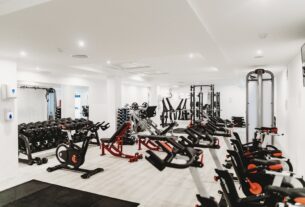Setting realistic health goals is essential when beginning a fitness journey. It requires an honest assessment of one’s current health status and desired outcomes. Goals should be specific, measurable, achievable, relevant, and time-bound (SMART).
For instance, rather than a vague goal like “lose weight,” a more effective goal would be “lose 10 pounds in three months by exercising three times weekly and improving dietary choices.” This approach provides clarity and a defined timeline. It’s crucial to consider personal limitations when establishing health goals. Factors such as current fitness level, existing health conditions, and daily schedules should be taken into account.
For example, individuals with demanding work schedules might find it more feasible to commit to 30-minute workouts three times a week rather than daily hour-long sessions. Tailoring goals to individual circumstances increases the likelihood of maintaining motivation and achieving success. Understanding one’s starting point and potential obstacles allows for the creation of more realistic and attainable health objectives.
This approach helps in developing a sustainable plan that can lead to long-term health improvements and lifestyle changes.
Key Takeaways
- Setting realistic health goals is important for long-term success and sustainability.
- Finding the right fitness program for you involves considering your preferences, schedule, and fitness level.
- Incorporating nutrition into your fitness plan is essential for achieving optimal results and overall health.
- Utilizing local resources for fitness support can provide motivation, accountability, and guidance.
- Overcoming common fitness challenges requires determination, flexibility, and a positive mindset.
- Tracking your progress and celebrating milestones can help you stay motivated and focused on your goals.
- Maintaining a healthy lifestyle beyond your initial goals is crucial for long-term health and well-being.
Finding the Right Fitness Program for You
Considering Your Workout Style
Some people excel in a group setting, while others prefer to work out alone. If you enjoy the camaraderie and motivation of working out with others, a group fitness class or team sport may be the perfect fit. On the other hand, if you prefer solitude and flexibility in your workout schedule, a home-based program or individual training sessions may be more suitable.
Assessing Your Fitness Level
It’s essential to consider your current fitness level when choosing a program. If you’re new to exercise, starting with a low-impact program such as yoga or walking can help you build a foundation of strength and endurance before progressing to more intense workouts. Conversely, if you’re already in good shape and looking to challenge yourself, a high-intensity interval training (HIIT) program or weightlifting regimen may be more appropriate.
Staying Engaged and Motivated
Ultimately, finding the right fitness program for you means considering your personal preferences and abilities to ensure that you stay engaged and motivated throughout your fitness journey. By doing so, you’ll be more likely to stick to your program and achieve your long-term fitness goals.
Incorporating Nutrition into Your Fitness Plan

Incorporating nutrition into your fitness plan is essential for achieving optimal results. A balanced diet that includes a variety of nutrients is crucial for fueling your body and supporting your fitness goals. This means consuming a mix of lean proteins, complex carbohydrates, healthy fats, and plenty of fruits and vegetables.
It’s also important to stay hydrated by drinking an adequate amount of water throughout the day. Meal planning and preparation can also play a significant role in supporting your fitness plan. By preparing healthy meals and snacks in advance, you can avoid impulsive food choices and ensure that you have nutritious options readily available.
Additionally, paying attention to portion sizes and mindful eating can help prevent overeating and support your weight management goals. Furthermore, it’s important to be mindful of how your nutritional needs may change as you progress in your fitness journey. For example, if you’re increasing your physical activity level, you may need to adjust your calorie intake to support your energy needs.
Consulting with a registered dietitian or nutritionist can provide personalized guidance on how to optimize your nutrition for your specific fitness goals.
Utilizing Local Resources for Fitness Support
| Local Resources | Benefits |
|---|---|
| Local Gyms | Convenient access to fitness equipment and classes |
| Community Centers | Affordable fitness programs and group activities |
| Outdoor Parks | Natural environment for walking, running, and outdoor workouts |
| Local Trainers | Personalized fitness guidance and support |
Utilizing local resources for fitness support can provide valuable opportunities for guidance, motivation, and accountability. Many communities offer a variety of fitness resources such as gyms, community centers, and recreational facilities that provide access to equipment, classes, and knowledgeable staff. Joining a local gym or fitness center can offer a supportive environment with access to professional trainers who can help design a personalized workout plan tailored to your goals and abilities.
In addition to traditional fitness facilities, many communities also offer outdoor recreational spaces such as parks, trails, and sports fields that can be utilized for physical activity. Taking advantage of these local resources can provide a refreshing change of scenery and an opportunity to engage in activities such as hiking, biking, or playing sports. Furthermore, local fitness communities and social groups can offer valuable support and motivation on your fitness journey.
Whether it’s joining a running club, participating in group fitness classes, or finding workout buddies at the local park, connecting with others who share similar fitness goals can provide encouragement and accountability. By utilizing local resources for fitness support, you can tap into a wealth of opportunities to enhance your physical activity and overall well-being.
Overcoming Common Fitness Challenges
Overcoming common fitness challenges is an integral part of maintaining long-term success on your fitness journey. One common challenge is finding the motivation to exercise regularly. To overcome this challenge, it can be helpful to establish a routine by scheduling workouts at the same time each day or week.
Additionally, finding activities that you enjoy can make exercise feel less like a chore and more like an enjoyable part of your day. Another common challenge is overcoming plateaus in progress. It’s normal for your body to adapt to exercise over time, which can lead to a plateau in results.
To overcome this challenge, it’s important to vary your workouts by incorporating different types of exercise, increasing intensity, or trying new activities to keep your body challenged and prevent stagnation. Furthermore, overcoming the challenge of maintaining consistency in nutrition can be addressed by planning and preparing meals in advance, keeping healthy snacks readily available, and seeking support from a nutrition professional if needed. By identifying common fitness challenges and implementing strategies to overcome them, you can stay on track towards achieving your health and fitness goals.
Tracking Your Progress and Celebrating Milestones

Monitoring Your Progress
Keeping track of your workouts, nutrition habits, and physical measurements can provide valuable insight into your progress over time. This can be done through journaling, using fitness apps or wearable devices, or working with a personal trainer who can help monitor your advancements.
Celebrating Milestones
In addition to tracking your progress, celebrating milestones along the way can provide positive reinforcement and encouragement. Whether it’s reaching a weight loss goal, improving your strength or endurance, or mastering a new exercise technique, acknowledging these achievements can boost your confidence and motivation to continue striving towards your long-term goals.
Recognizing Positive Changes
Celebrating milestones doesn’t always have to be about reaching specific numbers or benchmarks. It can also involve recognizing the positive changes in your overall well-being such as increased energy levels, improved mood, or better sleep quality. By tracking your progress and celebrating milestones both big and small, you can maintain a positive mindset and sense of accomplishment throughout your fitness journey.
Maintaining a Healthy Lifestyle Beyond Your Initial Goals
Maintaining a healthy lifestyle beyond your initial goals is essential for long-term health and well-being. Once you’ve achieved your initial health and fitness goals, it’s important to transition into a maintenance phase that focuses on sustaining the habits you’ve developed. This may involve adjusting your workout routine to maintain strength and endurance, continuing to make mindful food choices to support overall health, and finding new ways to stay active and engaged in physical activity.
Additionally, maintaining a healthy lifestyle beyond your initial goals means being adaptable and open to evolving your approach to health and fitness as needed. This may involve seeking out new challenges or setting new goals to continue progressing on your fitness journey. It could also involve exploring different types of physical activity or trying new recipes to keep your nutrition habits fresh and exciting.
Furthermore, maintaining a healthy lifestyle beyond your initial goals involves prioritizing self-care and overall well-being. This may include incorporating stress-reducing activities such as meditation or yoga into your routine, getting adequate rest and recovery time, and seeking support from healthcare professionals as needed. By maintaining a holistic approach to health and wellness beyond your initial goals, you can continue to thrive and enjoy the benefits of an active and balanced lifestyle for years to come.
If you’re looking to improve your fitness in Pensacola, you may want to check out this article on the benefits of outdoor workouts. Exercising outdoors can provide a refreshing change of scenery and offer a variety of terrains and challenges to keep your workouts interesting. Plus, getting some fresh air and vitamin D can have positive effects on your mood and overall well-being. So, if you’re in Pensacola and looking to take your fitness routine outside, be sure to give this article a read for some helpful tips and motivation.
FAQs
What are the benefits of regular fitness in Pensacola?
Regular fitness in Pensacola can lead to improved physical health, increased energy levels, better mental health, and a reduced risk of chronic diseases such as heart disease and diabetes.
What types of fitness activities are popular in Pensacola?
Popular fitness activities in Pensacola include running along the scenic coastline, cycling on the many bike paths, participating in group fitness classes at local gyms, and engaging in water sports such as paddleboarding and kayaking.
Are there outdoor fitness opportunities in Pensacola?
Yes, Pensacola offers a variety of outdoor fitness opportunities, including beach workouts, hiking and trail running in nearby state parks, and outdoor yoga classes in scenic locations.
What are some popular fitness facilities in Pensacola?
Popular fitness facilities in Pensacola include gyms with state-of-the-art equipment, yoga and Pilates studios, CrossFit boxes, and facilities offering group fitness classes such as spin, Zumba, and boot camp.
Are there fitness events and competitions in Pensacola?
Yes, Pensacola hosts various fitness events and competitions throughout the year, including running races, triathlons, and fitness expos. These events provide opportunities for individuals to challenge themselves and connect with the fitness community.



